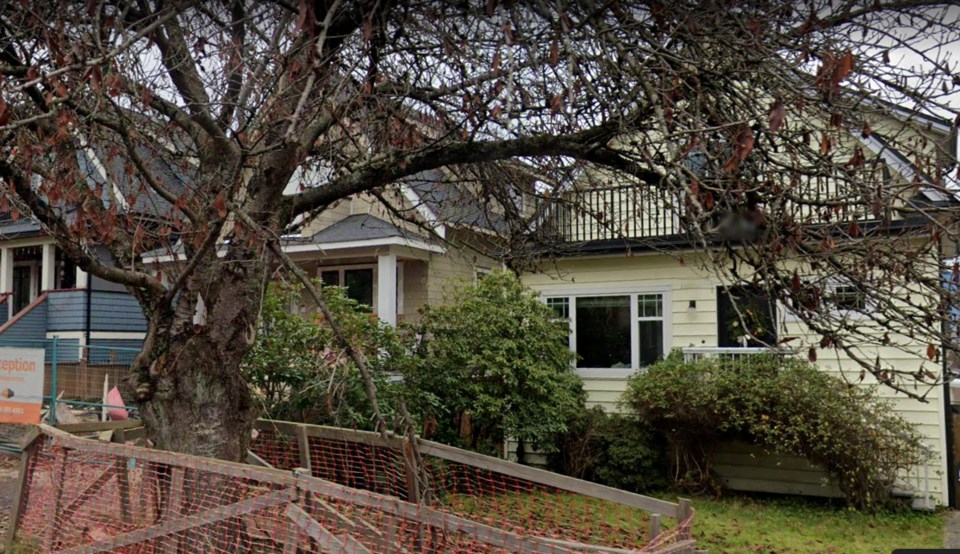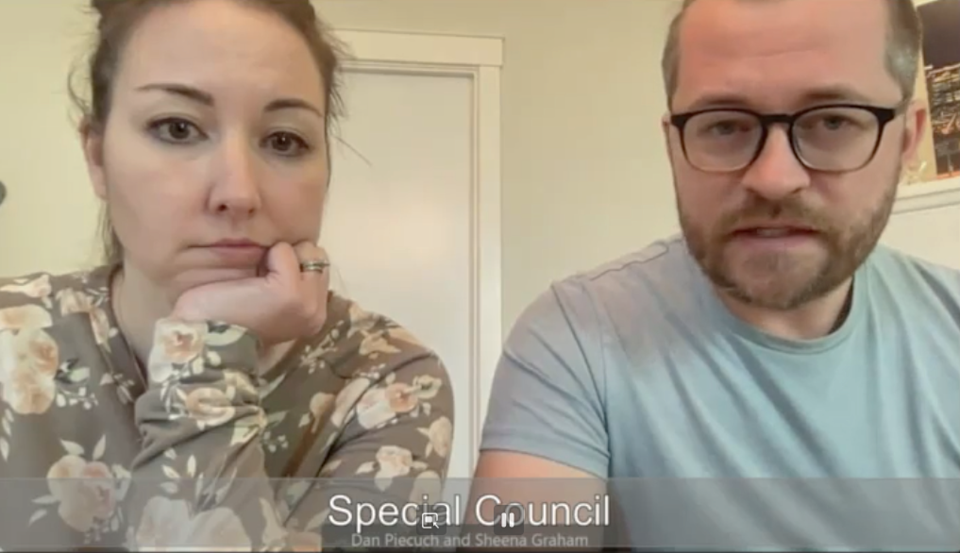When Daniel Piecuch and Sheena Graham bought an old house in East Vancouver in 2019, they weren’t aware the fully functional basement suite with a kitchen built 40 years ago was completed without permits.
In other words, it was illegal.
The couple was also unaware two of their decks were built without permits.
They found out the hard way after a visit in September 2021 from a city inspector who targeted the 114-year-old house on East 19th Avenue for operating an illegal short-term rental in the basement suite.
The inspector’s findings triggered the suspension of the couple’s short-term rental business licence — a move that was upheld Tuesday by three city councillors who comprised the business licence review panel.
“We pushed and we saved and we made it possible for us to own this home,” Piecuch told the panel during the hearing. “The unfortunate nature though that we're in — as you can see — is that we are now unfortunately visible to the city on so many counts.”
Under the city’s short-term rental bylaw, a homeowner cannot rent an illegal suite via a platform such as Airbnb. Same goes for the long-term rental market, although city lawyer Iain Dixon acknowledged that many illegal suites operate in Vancouver.
“We’re not actively looking for such suites, but once they come to our attention, it is the obligation of city staff to enforce the bylaws as they exist,” Dixon said.
“It is a long-term difficulty that we have with these ‘illegal suites.' But from a staff point of view, when they come to our attention, it's not a grey area — it's simply an illegal dwelling unit.”
'Thousands of case files'
The city does not inspect each property whose owners are granted a business licence for a short-term rental. An inspection is triggered either through a complaint, a random audit or staff research on suspected illegally-run operations.
Koji Miyaji, the city’s deputy chief licence inspector, said he couldn’t definitively say what triggered the inspection of the couple’s house, noting his department has “thousands of case files” that are reviewed.
“My understanding is [staff] saw the basement postings [on Airbnb], but your property’s licence was for the main and the second floor — the main house,” he told Piecuch during the hearing. “So there may have been a trigger there, but I can't say exactly what triggered them to do that.”
The concern from the city is the suite may be unsafe. Only a proper review from city inspectors with expertise in electrical work, plumbing and construction would be able to determine the safety of the suite, which was believed to have been built 40 years ago.
The couple, who has a young daughter, said the decision to begin renting the suite on Airbnb was to help them financially after Sheena lost her job. It was also used as a space for relatives when visiting, eliminating the need for them to rent hotel rooms, which occurred when the couple lived in a condo in Mount Pleasant.
The suite, which connects to the upper floor via a staircase, was an attractive feature in the couple’s decision to buy the house. The couple had the house inspected but didn’t check with the city about whether the suite was considered illegal.
It was a “buyer beware” point Miyaji made at the hearing, saying his department would strongly recommend prospective home buyers check the real estate listing information to ensure it is correct.
The city’s information on file for the couple’s house shows an unfinished basement and no decks. That information is available to the public and to realtors, Miyaji said.
“Those steps are what we would recommend to prevent any misunderstandings when individuals purchase a home,” he said.
To that point, Piecuch questioned Miyaji about how long it would take to obtain such information, noting how competitive the real estate market is in Vancouver for buyers. Miyaji didn’t directly answer the question, except to say that it was easy to obtain.
'It will cost some money to do'
Dixon acknowledged that prospective buyers move fast in Vancouver’s real estate market so not to lose out on a home.
“Unfortunately, people get caught in these types of situations where they're not aware of illegal work done without a permit in their house,” he said. “It can be brought into compliance, but it will cost some money to do.”
It wasn’t made clear at the hearing whether the couple’s decks would have to be removed.
Though the panel unanimously agreed to suspend the couple’s licence, each councillor noted the city’s willingness to work with Piecuch and Graham to rectify the violations, with the ability to again apply for a short-term rental licence.
“We are certainly conscious of how stressful housing and real estate are in Vancouver, and how complex some of these permitting issues can be,” said Coun. Christine Boyle, who chaired the hearing.
“That's not isolated in this incident…I think we are all absolutely sympathetic to these challenges and keen to figure out the appropriate pathways of support that make it easier.”
In his closing remarks, Piecuch said he and his wife have shown they are willing to work with the city to sort out next steps to make their suite legal, with no plans for a long-term renter.
“We are trying our best to figure it all out ourselves, as well and learning quite a bit,” he said, noting it could take months, even years to sort out. “It's not going to be something that will be rectified in a week or two. That is unfortunately the nature [of the situation] that we're in. We've inherited this. But it is a very safe house.”
As of Feb. 3, 2022, the city's website showed there were 2,501 active short-term rental listings in Vancouver. Since the short-term rental bylaw was implemented in 2018, the city has suspended 880 business licences and referred 177 cases for prosecution.
@Howellings




